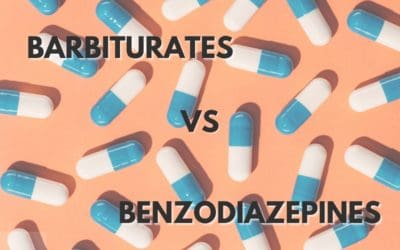What are Barbiturates?
Barbiturate drugs are classified as central nervous system depressants. They elicit a sense of relaxation and drowsiness when consumed. They were commonly used in the 60s and 70s to treat conditions such as anxiety, insomnia, and seizures. Today, treatment of such conditions has largely been replaced with the use of benzodiazepines due to the addictive nature and high risk of overdose associated with barbiturates.
How Do Barbiturates Work?
Barbiturate drugs have a mechanism of action that enhances GABA production, a neurotransmitter that inhibits nerve cell activity in the brain. This causes reduced nerve cell activity meaning that your brain receives fewer messages. This causes the slowing of the autonomic functions in our bodies such as breathing and heart rate which results a sedative-like effect.
Examples of Barbiturates
- Seconal (secobarbital)
- Seconal Sodium (secobarbital)
- Butisol Sodium (butabarbital)
- Medaral (mephobarbital)
- Nembutal Sodium (pentobarbital)
- Luminal (phenobarbital)
- Amytal Sodium (amobarbital)
- Nembutal (pentobarbital)
Drugs Commonly Confused with Barbiturates
Due to the similarity between benzodiazepines and barbiturates, many people confuse the two drugs. Although they are both used to treat similar conditions, they are chemically different compounds with different mechanisms of action. For those who ask “is Xanax or Klonopin a barbiturate?”, the answer is no. These substances are actually classified as benzodiazepines.
Barbiturates Street Names
Barbiturates are rarely prescribed for medical use. These days you are much more likely to encounter these drugs via illicit means. Common barbiturate street names include:
- Barbs
- Downers
- Sleepers
- Stumblers
- Yellow jackets
- Red dolls
- Tootsies
- Rainbows
Some of these street names are also used to refer to other classifications of drugs that have similar effects. “Downers” for example, can also be used to refer to benzodiazepines (benzos).
Barbiturates Uses
As mentioned previously, barbiturates were used commonly in the 60s and 70s for treating anxiety and insomnia. The introduction of benzodiazepines, an effective drug with a lower risk of addiction, has changed how and when barbiturates are used in the 21st century. Currently, we most commonly see barbiturate drugs reserved for the following uses:
- Severe insomnia
- Seizures that are unresponsive to alternative treatments
- Anesthesia
Side Effects
Side effects of barbiturate use may include:
- Drowsiness
- Headaches
- Mood Changes (Irritability)
- Diarrhea
- Nausea & Vomiting
- Low Blood Pressure
- Addiction
- Overdose
What is a Barbiturate Overdose?
One of the most severe side effects of barbiturate use is the risk of an overdose, meaning that too great of a dose was taken for the human body to safely process. Someone who is experiencing a barbiturate overdose is at risk of permanent kidney damage, coma, brain damage, and even death. Identifying a barbiturate overdose and reacting quickly to get treatment is imperative to avoid permanent damage. Signs of barbiturate drug overdose include:
- Disorientation
- Impaired judgment
- Slurred or slowed speech
- Slow, shallow breathing
- Loss of consciousness
Getting Help for Barbiturate Addiction
Although barbiturate abuse is much less common than it was several decades ago, it does still occur. Due to the severe potential for barbiturate addiction and overdose, getting help sooner rather than later is imperative. If you or a loved one is struggling with barbiturate abuse, addiction, or dependence, contact The Freedom Center admissions office today.

































